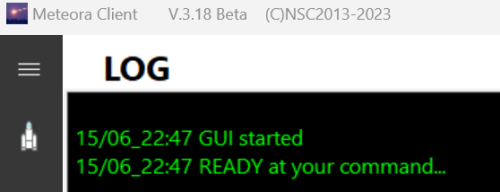Search the Community
Showing results for tags 'log'.
-
Version 3.16
939 downloads
LOG UDF, with or without GUI. Main focus is to keep it simple, so you have just to include _gollog.au3 and call: GOLLOG("a line of text"), and start logging. If your script is without GUI the log will be only written to disk, if you have a GUI you can initialize an edit control : GOLLOG_INI($guititle, $left, $top, $width, $height) and GOLLOG() will write your log both in an auto generated EDIT control in your $guititle GUI and disk; also GOLLOG_INI() will AUTO-create a GUI (if it doesn't exist $guititle) with a screen log if you want ! The majority of options (colors, fonts, position of logs ) are default-defined, but you can initialize them with GOLLOG_INI(), is all documented in the UDF and partially in the example. -
About logs, it is a few years that I drag a couple of functions between one script and another, so finally I decided to write down my first UDF to optimize my scripts. Main focus is to keep it simple, so you have just to include _gollog.au3 and call: GOLLOG("a line of text"), and start logging. If your script is without GUI the log will be only written to disk, if you have a GUI you can initialize an edit control : GOLLOG_INI($guititle, $left, $top, $width, $height) and GOLLOG() will write your log both in an auto generated EDIT control in your $guititle GUI and disk; also GOLLOG_INI() will AUTO-create a GUI (if it doesn't exist $guititle) with a screen log if you want ! The majority of options (colors, fonts, position of logs ) are default-defined, but you can initialize them with GOLLOG_INI(), is all documented in the UDF and partially in the example. There is also a function: GOLzipLOG($n) to ZIP logs older than $n months, based on the UDF (also included in attachments) _zip.udf by @wraithdu the UDF code: #include-once #include <File.au3> #include <_zip.au3> #include <EditConstants.au3> #include <WindowsConstants.au3> ; #INDEX# ======================================================================================================================= ; Title .........: GOLLOG ; AutoIt Version : 3.3.16.0++ ; Language ......: English ; Description ...: Smart logging system ; Author(s) .....: NSC ; Last revision..: 20220913 ; =============================================================================================================================== ; ------------------------------------------------------------------------------ ; This software is provided 'as-is', without any express or ; implied warranty. In no event will the authors be held liable for any ; damages arising from the use of this software. ; #VARIABLES# =================================================================================================================== ; internal use Global $gollog_count = 0 ;total number of chars in editbox Global $gollog_lastlog = "sicrlf" ;carriage return default yes "sicrlf" or no onetime "nocrlf", see func GOLLOG Global $gollog_cachelog = "" ;to count number of chars on single line Global $Gollog_edit = "" ;name of edit control ; to initialize with func _GOLLOG_INI Global $gollog_guititle = "" ;name of gui for checkin' if activate on screen loggin' Global $geleft = 0 ;left coord edit box Global $getop = 0 ;top coord edit box Global $gewidth = 0 ;width of edit box Global $geheight = 0 ;height of edit box ; optionally to initialize with func _GOLLOG_INI, otherwise default values used Global $GEfontcolor = "0x00FF00" Global $GEbkcolor = "0x000000" Global $GEfont = "consolas" Global $GEfontsize = 8 Global $gefontweight = 800 Global $gollog_logpath = @ScriptDir & "\logs" Global $gollog_logfile = $gollog_logpath & "\" & StringTrimRight(@ScriptName, 4) & "_LOG_" ; =============================================================================================================================== ; #CURRENT# ===================================================================================================================== ; GOLLOG_INI ; GOLLOG ; GOLzipLOG ; =============================================================================================================================== ; #INTERNAL_USE_ONLY#============================================================================================================ ; cleanedit ; =============================================================================================================================== #comments-start Changelog: ; V.2.31 2014-2015-2016-2018 only functions up to this version ; V.3.00 2018/07/30 first attempt to convert to UDF ; V.3.02 2018/08/03 bugfix in log folder creation ; V.3.03 2021/04/08 removed a undeclared variabile, caused a warning... $test = guicreate... ; V.3.10 2022/04/22 previously when the edit ctrl was full it was destroyed and recreated, now is only cleaned ; V.3.15 2022/05/03 rename and rationalization of global variables, minor bugfixes ; V.3.16 2022/09/13 GOLLOG_INI creates read only edits, to prevent accidental user inputs, $gollog_logpath bugfix ideas to do don't repeat timestamps, at least on GUI , or highlight only time changes in line option to display also as balloon text one or more lines in line option to write only on screen and not on disk in line option to change font size / color only on one line (looking $GEfontsize, $gefontweight) search a way to determine when the guictrledit is "full" #comments-end ; #FUNCTION# ==================================================================================================================== ; Name...........: GOLLOG_INI ; Description ...: Initialize variables for GOLLOG edit, and creates the GOLLOG EDIT BOX ; if the Gui window is not existant ($gollog_guititle) also creates the windows gui; in this case, the parameters of ; coords and dimensions are used for the new gui window, but are coords and dimensions are inverted ; due to different parameters order in GUICreate and GUICtrlCreateEdit ; if not called gollog only write to disk with default setting (because $gollog_guititle = "") ; if called with &guititle = "", the edit box related variables are ignored but you can still define values for the log file ; Syntax.........: GOLLOG_INI ($gollog_guititle, $geleft, $getop, $gewidth, $geheight[, $gefontcolor [, $gebkcolor [, $gefont [, $gefontsize [, $gefontweight [, $gollog_logfile ]]]]] ) ; Parameters ....: $gollog_guititle - name of gui ; $geleft - left coord of the edit (for windows gui: width) ; $getop - top coord of the edit (for windows gui: height) ; $gewidth - width of the edit (for windows gui: left coord) ; $geheight - height of the edit (for windows gui: top coord) ; $gefontcolor - optional color of font in edit control ; $gebkcolor - optional color of background of edit control ; $gefont - optional font type ; $gefontsize - optional size of font ; $gefontweight - optional weight of font ; $gollog_logfile - optional complete path\name of the logfile (datetime will be still added to the name) ; otherwise default path\name will be used ; Return values .: Success - Returns "OK" ; Failure - error message, sets @error = 1 ; set @extended ; |1 - left cooord missing ; |2 - top coord missing ; |3 - widht missing ; |4 - height missing ; Author ........: NSC ; Modified.......: ; Remarks .......: ; Related .......: GOLLOG ; Link ..........: ; Example .......: No ; =============================================================================================================================== Func GOLLOG_INI($Fguititle, $Fgeleft, $Fgetop, $Fgewidth, $Fgeheight, $FGEfontcolor = "0x00FF00", $FGEbkcolor = "0x000000", $FGEfont = "consolas", $FGEfontsize = 8, $Fgefontweight = 800, $Flogfile = $gollog_logpath & "\" & StringTrimRight(@ScriptName, 4) & "_LOG_") $gollog_guititle = $Fguititle $geleft = $Fgeleft $getop = $Fgetop $gewidth = $Fgewidth $geheight = $Fgeheight ; optionally to initialize with func _GOLLOG_INI, otherwise default values used $GEfontcolor = $FGEfontcolor $GEbkcolor = $FGEbkcolor $GEfont = $FGEfont $GEfontsize = $FGEfontsize $gefontweight = $Fgefontweight $gollog_logfile = $Flogfile If $gollog_guititle = "" Then Return "paramter GUI title missing" EndIf If $geleft = "" Then Return SetError(1, 1, "edit: left cooord missing") If $getop = "" Then Return SetError(1, 2, "edit: top coord missing") If $gewidth = "" Then Return SetError(1, 3, "edit: widht missing") If $geheight = "" Then Return SetError(1, 4, "edit: height missing") If Not WinExists($gollog_guititle) Then If $geleft = "" Then Return SetError(1, 1, "GUI: width missing") If $getop = "" Then Return SetError(1, 2, "GUI: heigh missing") If $gewidth = "" Then Return SetError(1, 3, "GUI: left cooord missing") If $geheight = "" Then Return SetError(1, 4, "GUI: top coord missing") GUICreate($gollog_guititle, $geleft, $getop, $gewidth, $geheight) ; removed $test = ; modify parameters to fit edit in "auto" generated GUI $gewidth = $geleft - 10 $geheight = $getop - 10 $getop = 5 $geleft = 5 cleanedit() GUISetState(@SW_SHOW) Else If $geleft = "" Then Return SetError(1, 1, "left cooord missing") If $getop = "" Then Return SetError(1, 2, "top coord missing") If $gewidth = "" Then Return SetError(1, 3, "widht missing") If $geheight = "" Then Return SetError(1, 4, "height missing") cleanedit() EndIf Return "OK" EndFunc ;==>GOLLOG_INI ; #FUNCTION# ==================================================================================================================== ; Name...........: GOLLOG ; Description ...: writes one line of log ; if there isn't edit control, the line is only written on the log file ; if there is also an associated edit control, it writes both on screen and on file ; Syntax.........: GOLLOG(ByRef $logtext) ; Parameters ....: $logtext - a string of text to be written down on disk and on screen ; if $logtext containg at the end a substring like "|nocrlf50" that line does not CR ("noCRLF") ; except if the max specified number of chars on the line ("50") is excedeed ; next call of Gollog() without substring "|nocrlf50" restores auto Carriage Return behaviour ; Return values .: n/a ; Author ........: NSC ; Modified.......: ; Remarks .......: ; Related .......: GOLLOG_INI,cleanedit ; Link ..........: ; Example .......: no ; =============================================================================================================================== Func GOLLOG($logtext) If Not FileExists($gollog_logpath) Then DirCreate($gollog_logpath) ; pre-UDF this was in the scripts EndIf $gollog_count += StringLen($logtext) Local $gollog_logfiletimerange = @YEAR & @MON Local $linelimit = StringRight($logtext, 2) If StringRight($logtext, 9) = "|nocrlf" & $linelimit Then $logtext = StringTrimRight($logtext, 9) Local $acapo = "no" Else Local $acapo = "si" $gollog_count += 4 If $gollog_count > 10000 And $gollog_guititle <> "" Then ;Sleep(3000) cleanedit() ; MsgBox(64, "debug", $conta) $gollog_count = 0 EndIf EndIf If $acapo = "no" And (StringLen($gollog_cachelog) <= $linelimit) Then ;pearl perla no CRLF if > linelimt If $gollog_lastlog = "nocrlf" Then If WinExists($gollog_guititle) Then ; no GUI so no on screen log GUICtrlSetData($Gollog_edit, $logtext, 1) EndIf Else If WinExists($gollog_guititle) Then ; no GUI no on screen log GUICtrlSetData($Gollog_edit, @MDAY & "/" & @MON & "_" & @HOUR & ":" & @MIN & " " & $logtext, 1) EndIf EndIf $gollog_cachelog = $gollog_cachelog & $logtext $gollog_lastlog = "nocrlf" Else If $gollog_lastlog = "nocrlf" Then If WinExists($gollog_guititle) Then ; no GUI no on screen log GUICtrlSetData($Gollog_edit, $logtext & @CRLF, 1) EndIf $gollog_cachelog = $gollog_cachelog & $logtext _FileWriteLog($gollog_logfile & $gollog_logfiletimerange & ".txt", $gollog_cachelog) $gollog_cachelog = "" Else If WinExists($gollog_guititle) Then ; no GUI no on screen log GUICtrlSetData($Gollog_edit, @MDAY & "/" & @MON & "_" & @HOUR & ":" & @MIN & " " & $logtext & @CRLF, 1) EndIf _FileWriteLog($gollog_logfile & $gollog_logfiletimerange & ".txt", $logtext) EndIf $gollog_lastlog = "sicrlf" EndIf EndFunc ;==>GOLLOG ; #FUNCTION# ==================================================================================================================== ; Name...........: GOLzipLOG ; Description ...: takes all log files older than specified number of months, and zip these in a unique zip file, in the same folder ; Syntax.........: GOLLOG(ByRef $months2notZIP) ; Parameters ....: $months2notZIP - number of months (age of log files) to not zip ; Return values .: n/a ; Author ........: NSC ; Modified.......: ; Remarks .......: ; Related .......: ; Link ..........: ; Example .......: no ; =============================================================================================================================== Func GOLzipLOG($months2NOTzip) ; zipping old log leaving unzipped only n months GOLLOG("ZIPping log files older than " & $months2NOTzip & " months") Local $hSearch = FileFindFirstFile($gollog_logfile & "*.txt") ; searching for logs Local $logconta = 0 Local $gollog_logfiletimerange = @YEAR & @MON While 1 ; single file processing cycle Local $sFileName = FileFindNextFile($hSearch) ; If there is no more file matching the search. If @error Then ExitLoop Local $stringtime = StringTrimRight(StringRight($sFileName, 10), 4) ;obtaining year-month like 201609 If $gollog_logfiletimerange - $stringtime > $months2NOTzip Then ;zipping If Not FileExists($gollog_logfile & ".zip") Then If Not _Zip_Create($gollog_logfile & ".zip", 1) Then GOLLOG("ERROR " & @error & " creating " & $gollog_logfile & ".zip") Else GOLLOG("Created new log archive: " & $gollog_logfile & ".zip") EndIf Else GOLLOG("adding to archive: " & $gollog_logfile & ".zip") EndIf If Not _zip_additem($gollog_logfile & ".zip", $gollog_logpath & $sFileName) Then GOLLOG("ERROR " & @error & " zipping: " & $gollog_logpath & $sFileName) Else GOLLOG("Added: " & $gollog_logpath & $sFileName) $logconta += 1 If Not FileDelete($gollog_logpath & $sFileName) Then GOLLOG("ERROR - Unable to DELETE log file " & $gollog_logpath & "\" & $sFileName) EndIf EndIf EndIf WEnd GOLLOG("Finished = " & $logconta & " log files zipped") EndFunc ;==>GOLzipLOG ; #INTERNAL_USE_ONLY#============================================================================================================ ; Name...........: cleanedit ; Description ...: create the edit box delete edit box and recreate it with same parameters ; when the edit box is "full" of chars delete edit box and recreate it with same parameters ; parameters are global variables specified in GOLLOG_INI ; Syntax.........: cleanedit() ; Parameters ....: n/a ; Return values .: n/a ; Author ........: NSC ; Modified.......: ; Remarks .......: ; Related .......: GOLLOG_INI ; Link ..........: ; Example .......: no ; =============================================================================================================================== Func cleanedit() ; cleaning of edit every n° lines (in program put if $nlines > xlines then this function) If GUICtrlGetHandle($Gollog_edit) = 0 Then $Gollog_edit = GUICtrlCreateEdit("", $geleft, $getop, $gewidth, $geheight, BitOR($ES_AUTOVSCROLL, $ES_AUTOHSCROLL, $ES_WANTRETURN, $WS_BORDER,$ES_READONLY)) GUICtrlSetData(-1, "" & @CRLF) GUICtrlSetFont(-1, $GEfontsize, $gefontweight, 0, $GEfont) GUICtrlSetColor(-1, $GEfontcolor) GUICtrlSetBkColor(-1, $GEbkcolor) GUICtrlSetCursor(-1, 3) Else GUICtrlSetData($Gollog_edit, "") EndIf EndFunc ;==>cleanedit the example code: ; *** GOLLOG UDF test script *** ;~ ; (C) NSC 2018-2022 #include <_GOLLOG.au3> MsgBox(64, "GOLLOG example 1", "no GUI, only write on disk, check the log file in @scriptdir" & @CR & "note: no initialization GOLLOG_INI() is required!") Gollog("this is the first line of log only in the file") MsgBox(64, "GOLLOG example 2", "log and edit on pre-existant GUI") $mygui = "edit on existant gui" GUICreate($mygui, 600, 300, 300, 300) GUISetState(@SW_SHOW) gollog_ini($mygui, 5, 5, 590, 290) ;basic initialization, no aestetic options Gollog("this is the first line |nocrlf50") ; no carriage return with -> |nocrlf50 Gollog("on the pre-existant GUI") ; auto CR restored sleep(1000) $a = 0 While $a < 50 GOLLOG("Example 2 line:" & $a) $a += 1 Sleep(90) WEnd GUIDelete($mygui) MsgBox(64, "GOLLOG example 3", "log and edit on 'auto' generated GUI") $mygui = "auto generated GUI" gollog_ini($mygui, 600, 300, 200, 200, "0x0033cc", "0xffff00", "courier") ; initialization with colors and font choice, more options see the UDF Gollog("this is the first line |nocrlf50") Gollog("on the 'auto' generated GUI") sleep(1000) $a = 0 While $a < 50 GOLLOG("Example 3 line:" & $a) $a += 1 Sleep(70) WEnd MsgBox(64, "GOLLOG example 4", "auto re-creation of edit") ; recreate edit before it is "full" Gollog("to recreation of edit control") sleep(1500) While $a < 2500 GOLLOG("Example 4 line:" & $a ) $a += 1 WEnd Greetings to all of you. PS udf + example code in download section:
-
Hello guys. It's been awhile since I shared something. So today I want to share my last project. What's Loga? Loga is a simple logging library to keep track of code with an integrated console. Features. Common log levels. Integrated console. Multiple instances. Custom color and font for each instance log level. Define output format with macros. Conditional and occasional Logging. Easy to use. Basic Usage: #include "..\Loga.au3" ;This are some of the default settings: ;Default log level $LOGA_LEVEL_TRACE ;output format: {Symbol}{LogIndex} {LevelName} {LongDateTime} {Message} ;Log to File is enabled. ;Log file name format: YYYYMMDDHHMM-Loga-InstanceIndex.log ;Custom Console is disabled by default. ;By default log to STDOUT. _LogaTrace("I'm Trace") _LogaDebug("I'm Debug") _LogaInfo("I'm Info") _LogaWarn("I'm Warn") _LogaError("I'm Error") _LogaFatal("I'm Fatal") More examples here. Check Loga on GitHub. Loga Latest Release v1.0.2. Saludos
- 29 replies
-
Write file based on script completion
MarkBuchanan posted a topic in AutoIt General Help and Support
Hello, I am new to AutoIt so please bare with me. I am trying to write a script that installs a certain program on Win 10 and then based on a successful install create a file in a specific directory. Below is my install script which works, just not quite sure how to get it to write the file when its done. My thought is to add a "If FileExists" command at the end to make sure that the files are in the install folder and based on that write the file just not sure how to accomplish it. I hope that makes sense and thank you in advance for any help. Local $Title="MobilePass Install" Local $FilePATH="\\XXXXXXX\XXXXXX" Local $UserName "*****8" Local $Password = "*******8" ;Check if Application location already exists If FileExists ("C:\Program Files\WindowsApps\05EB1CFA.SafeNetMobilePASS_1.8.3.0_x64__bnm8hg3x9na9j") Then Exit Else Local $pid = RunAsWait ($UserName, $ComputerDomainName, $Password, 1, "MobilePASS+Setup_1.8.3.0_signed.exe", "", @SW_HIDE ) Endif -
Hello Sir, While searching for the solution to my problem, I have just gone through some of your old post. My name is Alok Arora Email id is *snip* I am writing a code to store logs for each script I run. This I did by using FileWriteLog function and it is successfully storing logs in txt file. Now, I have to work on to read the log file and if any script has been mistakenly clicked twice in a day script will pop up a message that task already done for the day by verifying entries in the log file. I have the logic for it.. I mean a variable will read the log file and will search for the entry and will perform action if entry found or not. I believe for reading the file I can write a code like $i =fileread("logfile.txt") Now I am stuck on how to compare the log entry in log file. Can you please help me in this?
-
I have another AutoIT script making a Log file Sample of Log file: 2016/08/22 12:44:18 > Process: [RUNNING] [ACTIVE] 2016/08/22 12:48:35 > Process: [WAS NOT RUNNING] 2016/08/22 13:40:00 > Process: [FAILED] 2016/08/22 14:01:10 > Process: [WAS NOT RUNNING] I am looping through the Log file for the word "FAILED" I then want to get all lines that have "FAILED" and get their TIME My Current code to get this far: If FileExists($fileLog) Then $contents = FileRead($fileLog) If @error Then MsgBox(0, 'File Error', $fileLog & ' could not be read.') Else For $i = 1 To _FileCountLines($fileLog) $result = StringInStr($contents,$search) If $result >= 1 Then $filteredLine = FileReadLine($fileLog,$i) If StringInStr($filteredLine,$search) Then ConsoleWrite($filteredLine & @CRLF) ; this gets me the results I want sans the time parse EndIf Else ConsoleWrite( $search & " not found!" & @CRLF) EndIf Next EndIf EndIf For this part: If StringInStr($filteredLine,$search) Then ConsoleWrite($filteredLine & @CRLF) ; this gets me the results I want sans the time parse EndIf OUTPUT: 2016/08/22 13:40:00 > Process: [FAILED] I dont understand how I read the time in that output? I have tried _DateTimeFormat - Dont think this applies Tried _DateDiff - I dont have a the date yet so this doesnt work Would love if someone could tell me if I am thinking is the wrong direction and possibly lead me down the correct path to light side of the force
-
Hi there - quite a beginner to codding so please bare with me... i am writing an autoit code that will be running 24/7 executing various tasks every 10-20 minutes. it suppose to run on unattended server but i would like to occasionally remote log in and do stuff on the server without disturbing the autoit script (while the autoit script is in Sleep count). to achieve this I will need to know at what point in the commands run it is and how long roughly until the next command (I use Sleep in between commands)... so, is there a way to create a monitor that shows me the last command executed and how long of the Sleep is left (like in a small window or in the windows task bar)? failing that any idea how can I utilize the FileWriteLog function to keep updating an always open text file ? thanks in advance michel
-
Hello, first time poster here I am working on a project that has to parse a log file in real time. The thing is I know it's hard for Autoit to attach itself to log files when they're already in use by other programs, at least in my experience. I was taking a look at this thread because the log file is quite large and I think Autoit might be a little slow on it's own. The thing is I don't know how to use this properly to extract all data out of a log file or is there a native way to do this using Autoit. Basically , I just need a log parser that is able to read from a log that is 'already opened' and 'being written to' Thanks!
- 11 replies
-
Hello everyone, I have been a member for a while but relatively new to posting to the message boards. I am also still relatively new to using AutoIt. I am working on a script that will help keep a program running on one of my file servers. Here is what I have accomplished so far looking at different threads on the site already. 1. A check performed every 60 seconds to see if the application is running. (ultimately to be changed to something like once an hour) 2. Write a log file that shows either the check was performed with no issue or the application had to be restarted. Both of those are working fine and I have to say that ever since I started using this script the program has not crashed! My next phase is to figure out how to make the script check and trim the log file. I am obviously not trying to make a log file that becomes bloated and chews up a large amount of hard drive space. The main purpose of the log file is so that I know if the application has been restarted. I am thinking have the script trim the file every 30 day maybe. Another words delete everything in the log file 30 days prior to the current day. So if someone can help me out here as I am not a scripting genius. Unfortunately I only know enough to be dangerous if you will. I also have another part of this script I want to write but first I want to get the log file working just the way I want. I am attaching a sample of what I have working so far. Thank you for any and all help folks. Respectfully, James #include <File.au3> While 1 ;Start Loop If ProcessExists("atcsmon.exe") Then ;~ Open the logfile in write mode. Local $hFile = FileOpen(@ScriptDir & "\ATCS_AutoIt.log", 1) _FileWriteLog($hFile, "ATCS check was completed and found running by the AutoIt3 Script") ; Write to the logfile passing the filehandle returned by FileOpen. FileClose($hFile) ; Close the filehandle to release the file. Else ;If Process does not exist Run("C:\atcs_monitor\atcsmon.exe", "", @SW_SHOWMINIMIZED) ;~ Open the logfile in write mode. Local $hFile = FileOpen(@ScriptDir & "\ATCS_AutoIt.log", 1) _FileWriteLog($hFile, "*ALERT* *ALERT* *ALERT* ATCS was restarted by the AutoIt3 Script") ; Write to the logfile passing the filehandle returned by FileOpen. FileClose($hFile) ; Close the filehandle to release the file. EndIf Sleep(60000) ;sleep 60 seconds WEnd ;Close Loop
-
What are the GUI functions that can be used to create such as a message log (3) and a local pane (4)? Kindly visit Navigating and window layout referring to the numbers above if you don't know what I mean..








